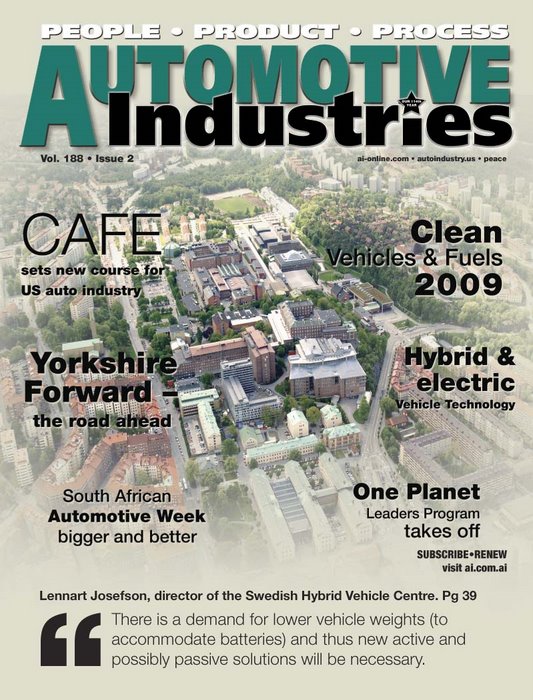
INTERVIEW – The Swedish Hybrid Vehicle Centre, part of the Chalmers University of Technology’s initiative to develop hybrid vehicle technology, is currently working on the development of new battery technologies. The Centre is working on the development of lithium-ion based cells plus it is starting new projects on models for life assessments of batteries, based on extensive testing of battery systems.
In 2007 the Swedish Hybrid Centre was set up by the Chalmers University of Technology in Gothenburg with a SEK 32.5 million grant from the Swedish Energy Agency. The Centre’s other partners include the Royal Institute of Technology, Lund University of Technology, AB Volvo, Volvo Car Corporation, Saab Automobile, GM Powertrain Sweden, Scania and BAE Systems Hagglunds.
Another research unit at Chalmers University is the SAFER Vehicle and Traffic Safety Centre. Here, research spans a broad base, covering several disciplines and encompassing both traffic and vehicle safety in real environments. The centre’s activities engage the very elite in the field of traffic safety, and the results contribute to increasing the competitive advantages of the centre’s partner companies and organizations. The SAFER centre has 22 partners from academia, industry and society cooperate in the design of future vehicle and traffic safety systems.
Both the SAFER Vehicle and Traffic Safety Centre and the Swedish Hybrid Vehicle Centre are working together to bring competences in hybrid vehicle technology and vehicle safety together. The objective is to propose new (light weight) vehicle architectures, with electric motors as primary energy source, that can meet future safety requirements.
The Swedish Hybrid Vehicle Centre emphasizes a holistic view of the need to find solutions to the growing issues of cutting emissions and reducing fuel consumption by the transportation industry. “Hence, the technical part of the Centre’s research program will focus on system level studies of hybrid electric vehicle systems. This work is supported by work in three parallel thematic areas – system studies and tools, (methods for virtual development, algorithms for modeling, monitoring, control and optimization, simulation platform). The second is electrical machines and drives, (electrical machines, drives, auxiliary systems, power electronics, electric safety, EMC, design and production technology). And finally, energy storage, (degradation and performance of batteries and super capacitors, evaluation and implementation of batteries and battery management concepts, battery production),” says the Centre.
Of particular interest is the development of hybrid vehicle technology, which can utilize existing and future propulsion systems in an optimal manner. The Swedish Hybrid Vehicle Centre which opened in 2007, will get the full grant over four years till December 31st 2010, after which it will probably get a mandate to continue for another six years. Apart from developing technologies for hybrid vehicles, the Centre’s other objective is also to function as a hub for Swedish hybrid vehicle research and development.
It hopes to play an important role as a first step in a revolutionary change from ICE to electric propulsion. It has listed its objectives as creating knowledge and understanding for the fundamental processes in hybrid vehicle technology through experiments, simulations and modeling.
Automotive Industries spoke to Lennart Josefson, director of the Swedish Hybrid Vehicle Centre.
AI: Please tell us a little about any new developments at the Centre.
Work is continuing in our research projects, one may note work with energy management of hybrid vehicles considering routes travelled, and the development of electric motors operating with integrated charging
AI: With the global automotive industry looking to green technologies to pull it out of its current slump, has there been any added interest in the Swedish Hybrid Vehicle Centre?
Yes, we had an official inauguration last June which attracted a lot of interest, as well as our attempts to inform Swedish subcontractors for our work
AI: Apart from your existing partners from the automotive industry, have other vehicle manufacturers come forward to partner with the Centre?
No we have no new formal partners in SHC
AI: Please tell us a little about the work the Centre is doing with lithium-ion technologies and some of the challenges facing this technology that have to be tackled.
Work with Li-based batteries is on-going at several places throughout the world as it is seen as the next generation of batteries for hybrid vehicles and electric vehicles. At SHC we have projects working with the battery cell, trying to find material combinations that will improve the energy output and also the safety. We have also started projects dealing with the performance of battery systems.
AI: What are some of the challenges facing hybrid vehicles in terms of safety issues and how is the work Chalmers University likely to impact these issues?
There are two challenges hybrid vehicles (and electric vehicles) will face, the safety of the energy storage, i e the energy storage must sustain normal operations and also impact loads. Secondly there will be now requirements for EV:s in particular, with a demand for lower vehicle weights ( to accommodate batteries) and thus new active and possibly passive solutions might be necessary. We aim to address this latter issue in a collaboration with the Centre SAFER (Traffic and Vehicle safety).













More Stories
Some Ways How Motorists End Up in Collisions at U-Turns
Maximise Margins with Proven PPF Tactics
Finding the Car Boot Release Button – Tips and Tricks